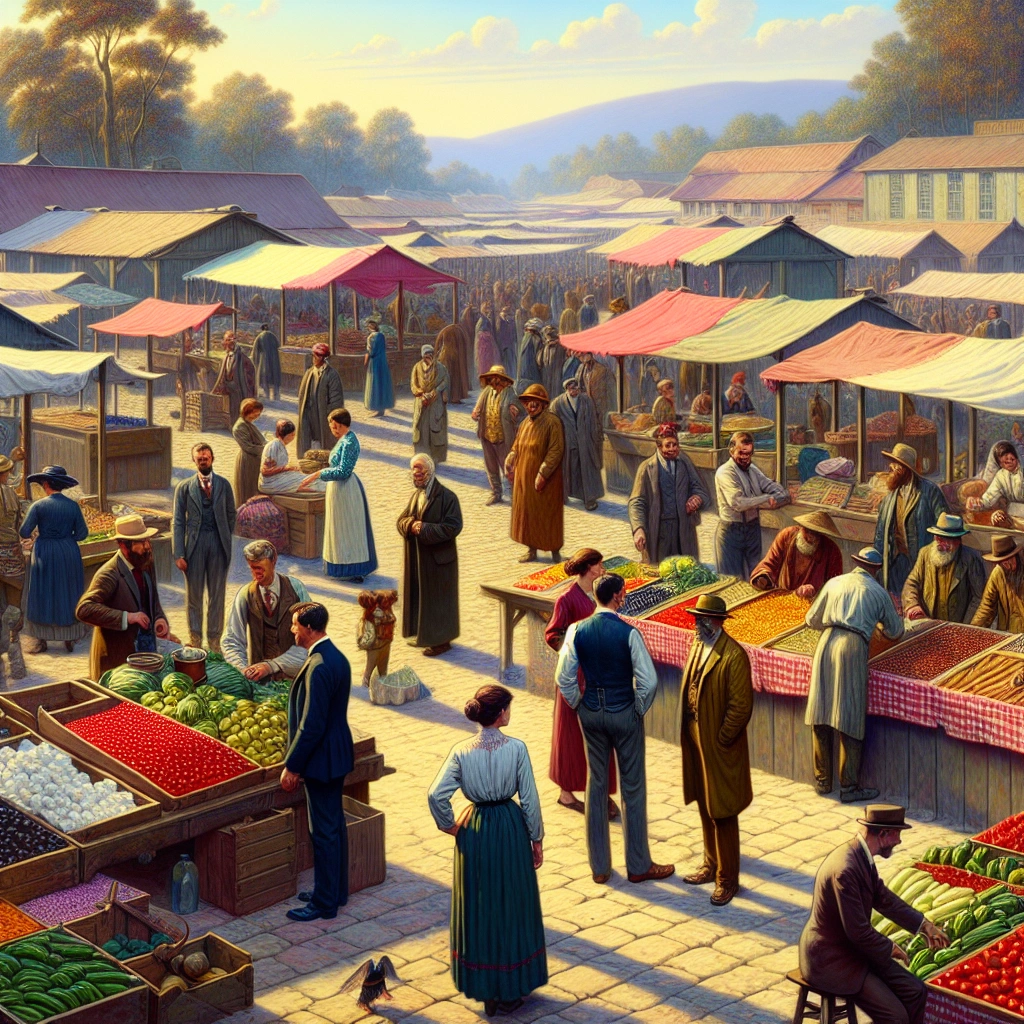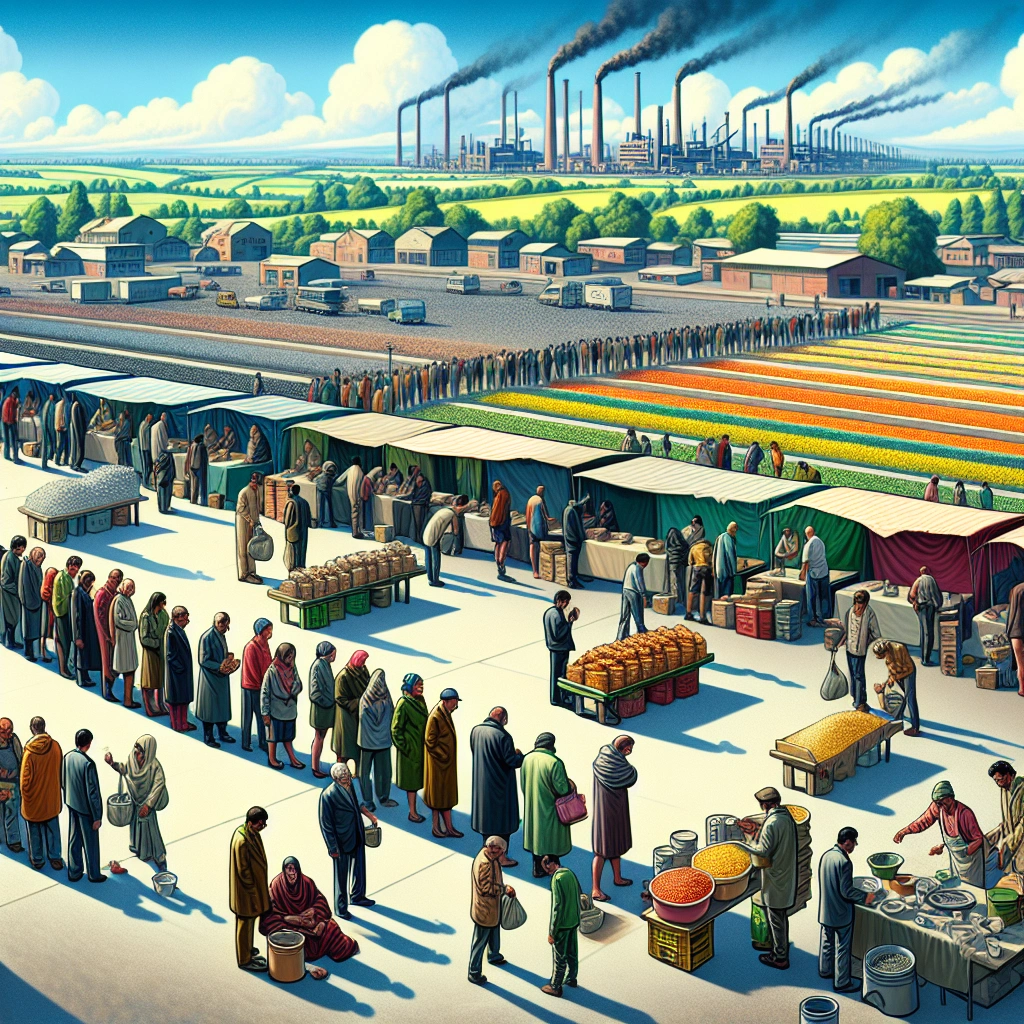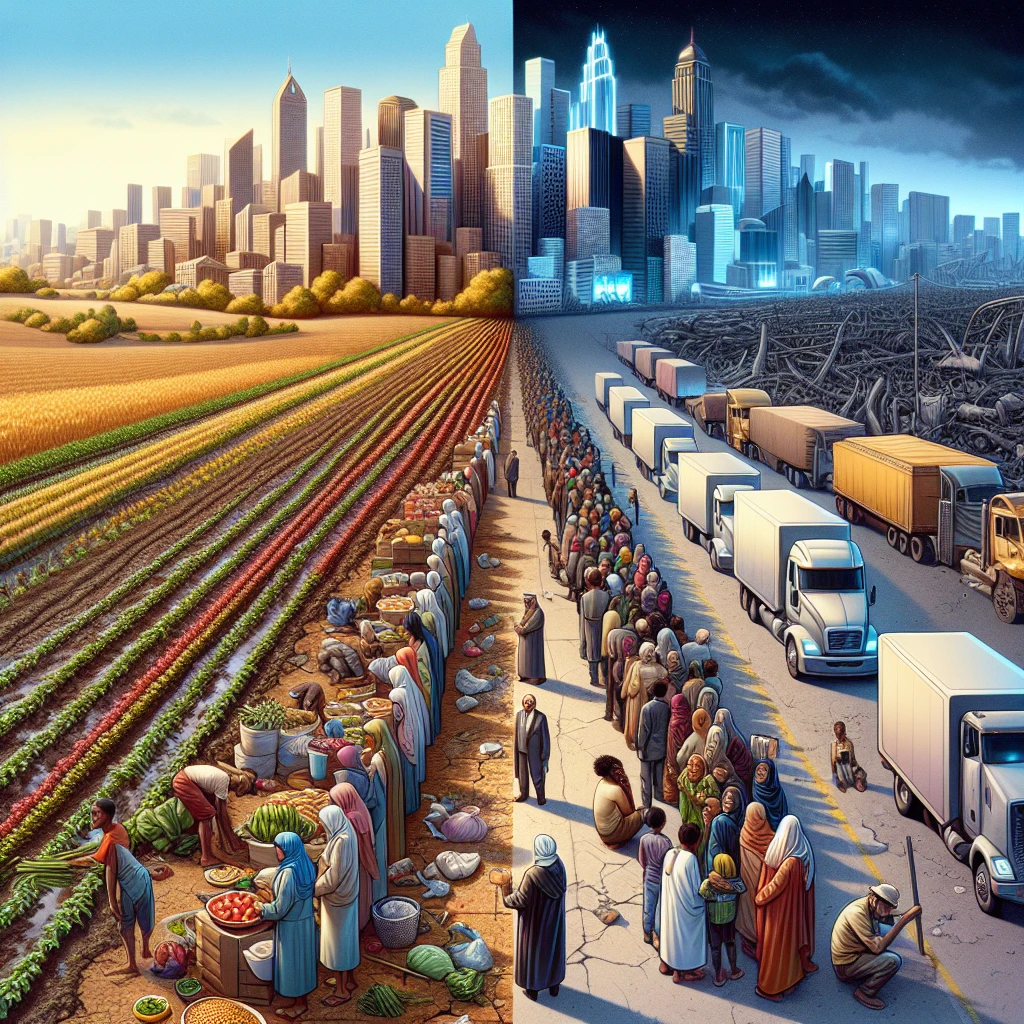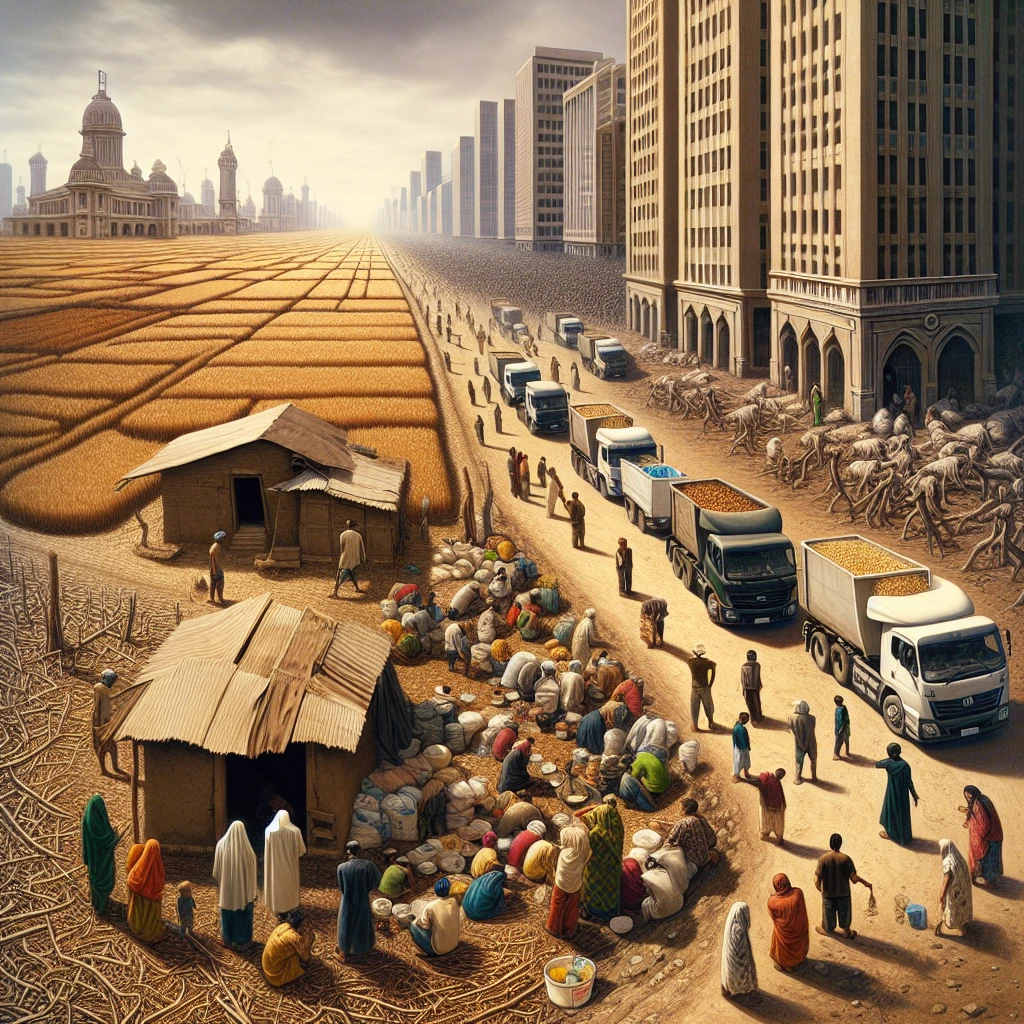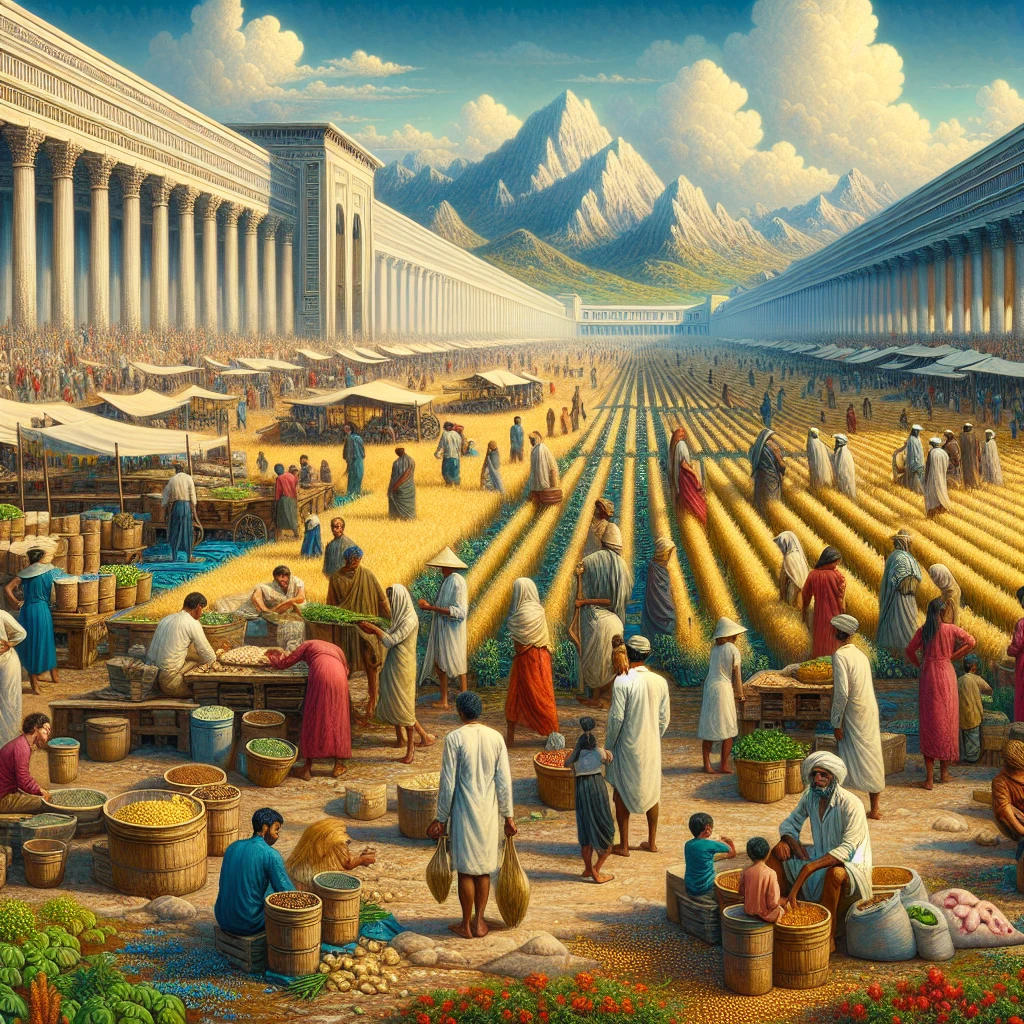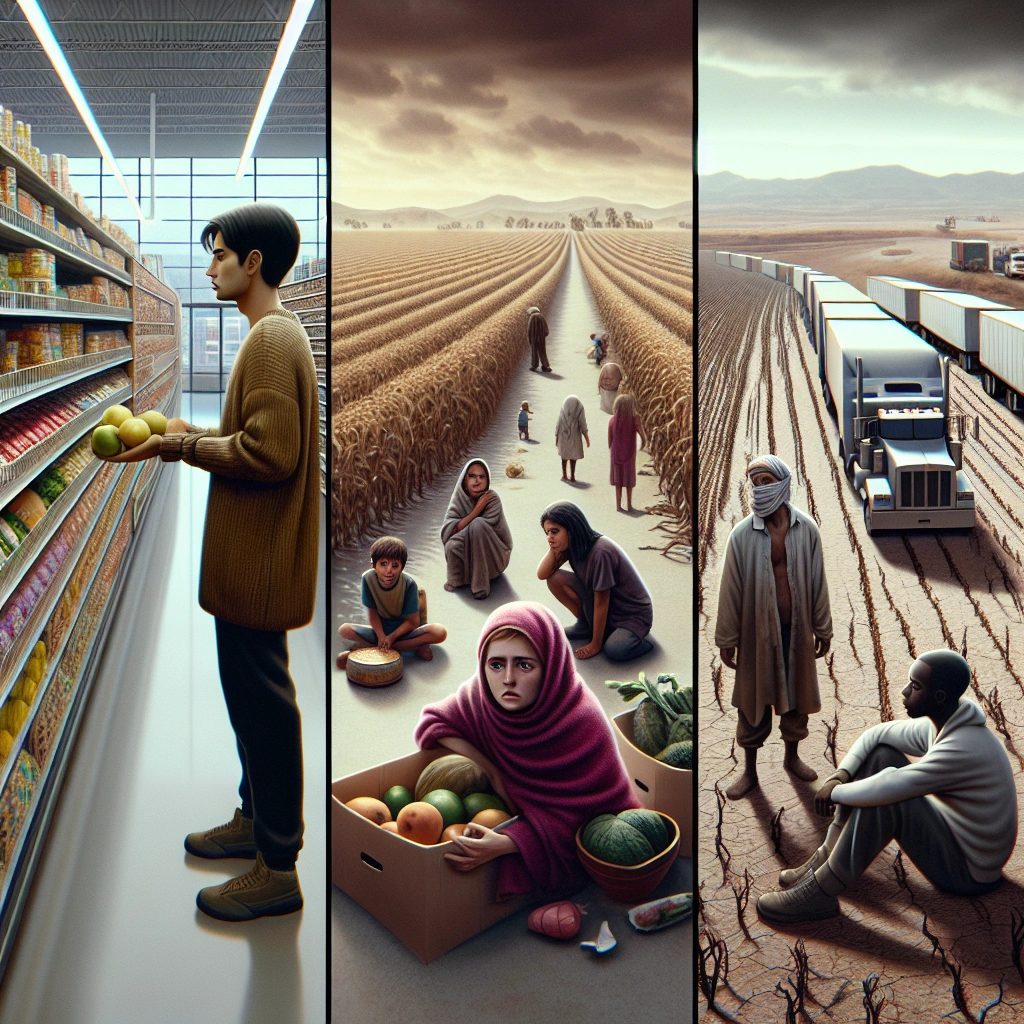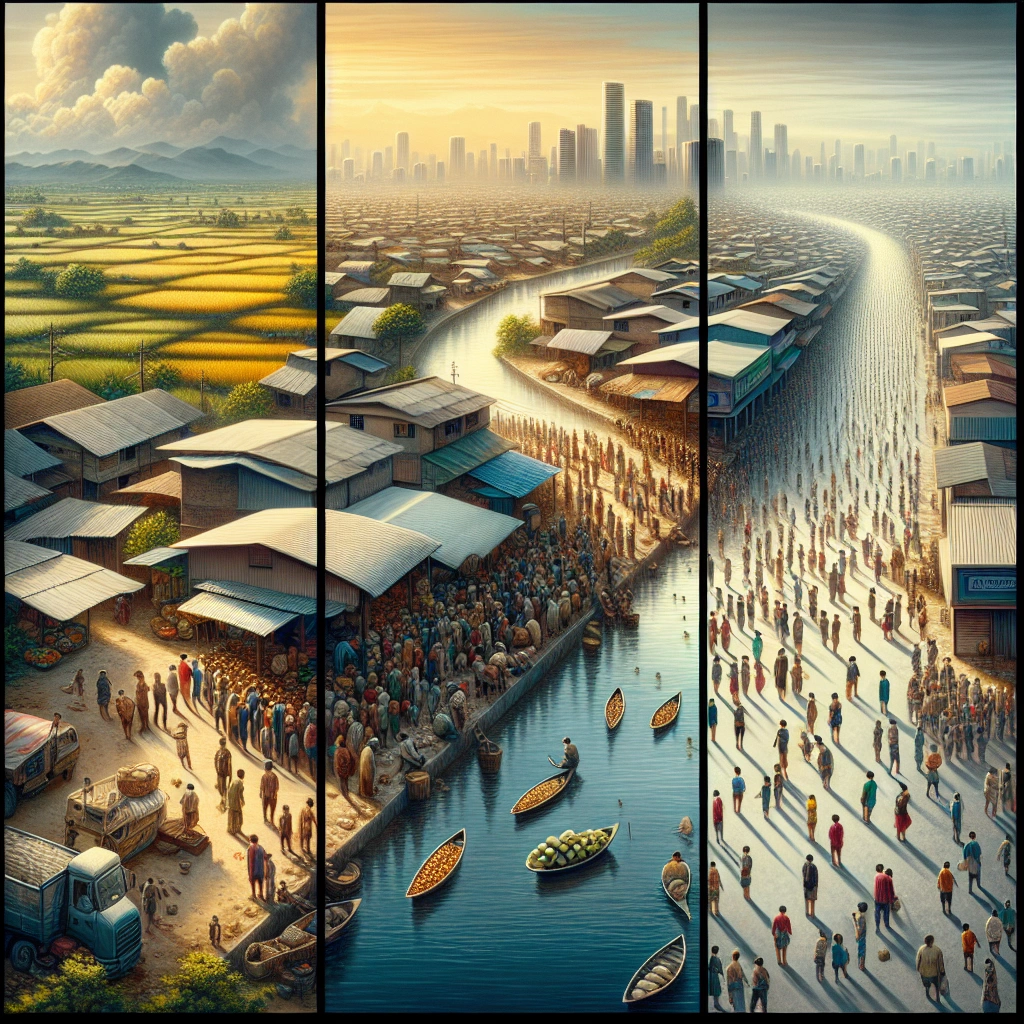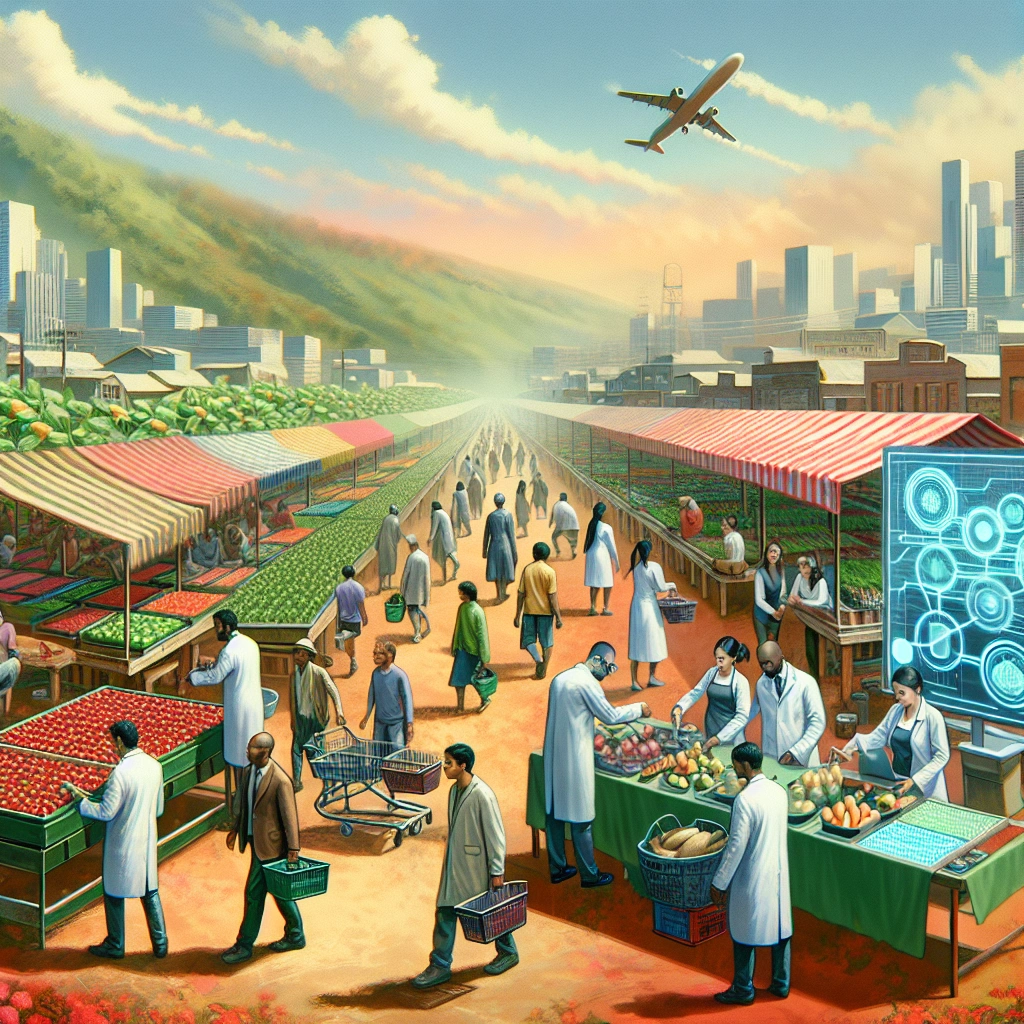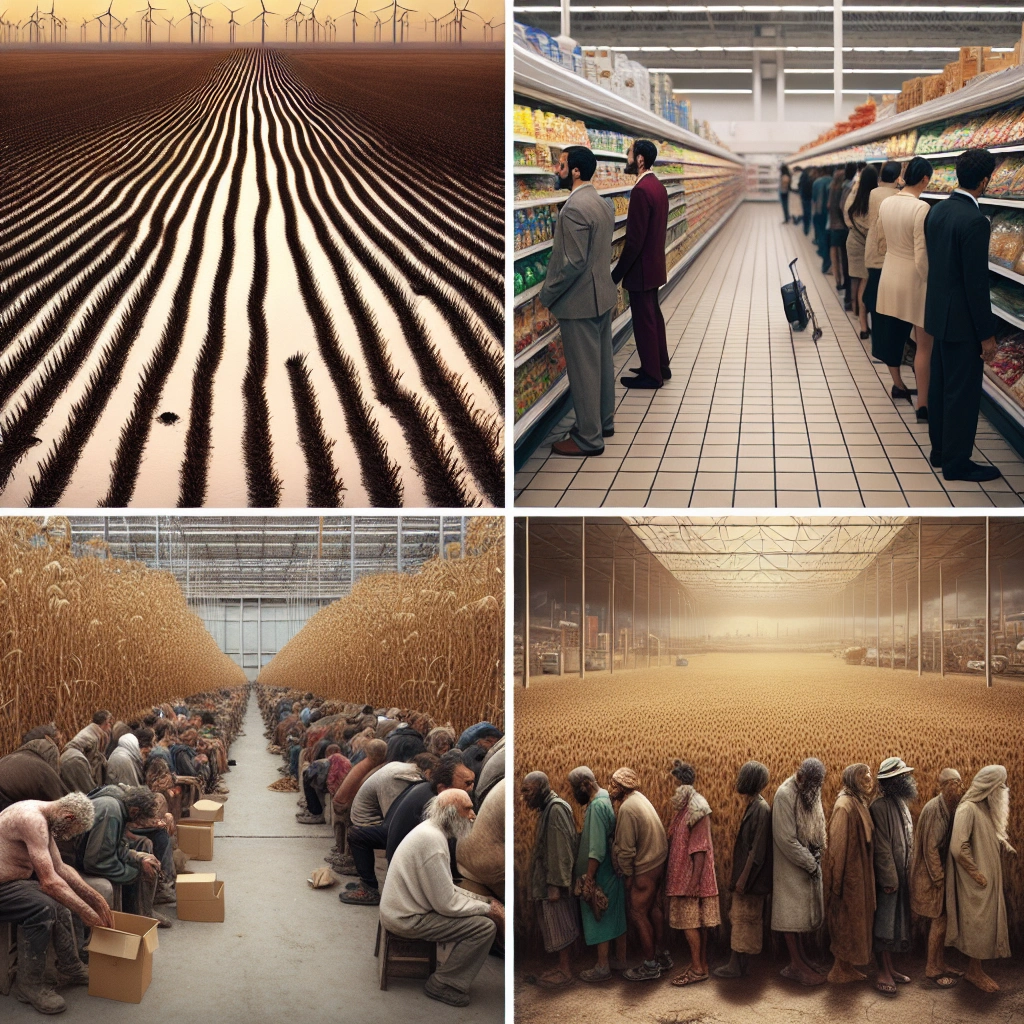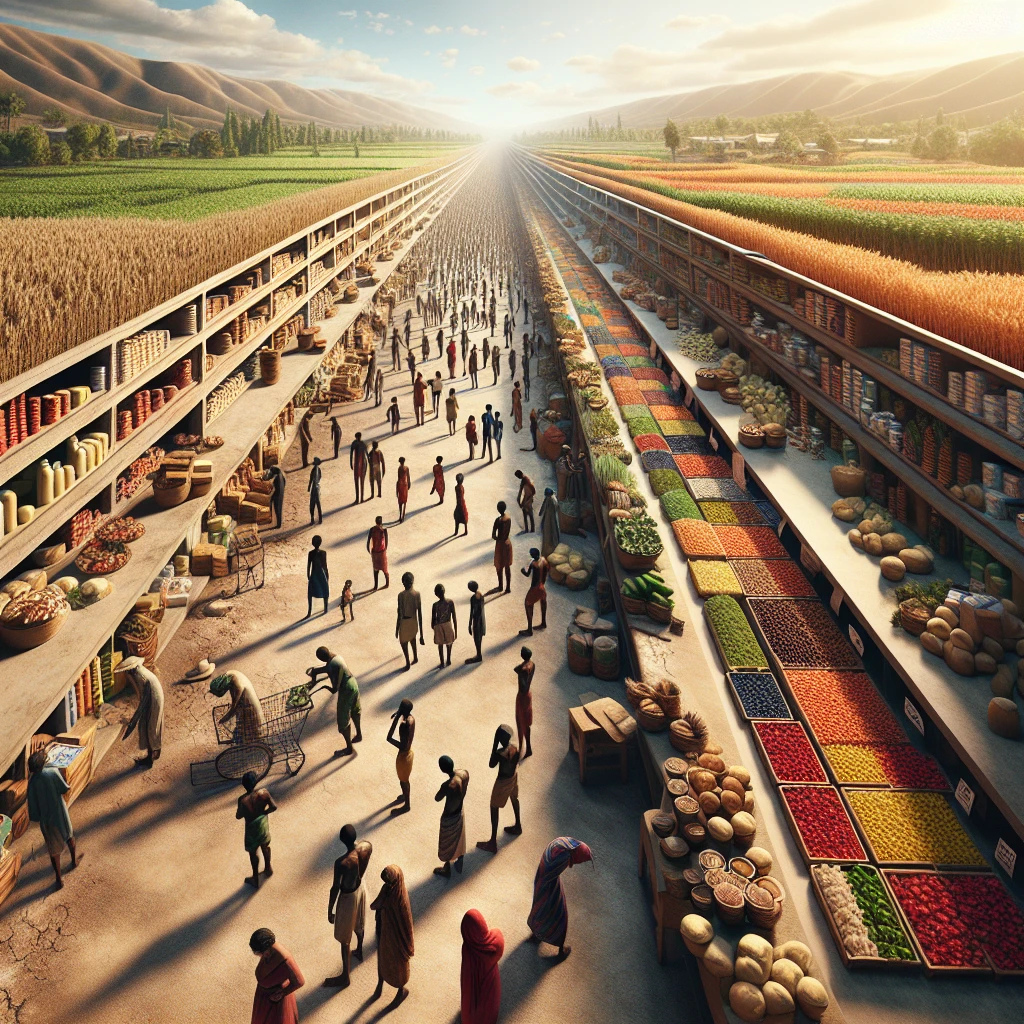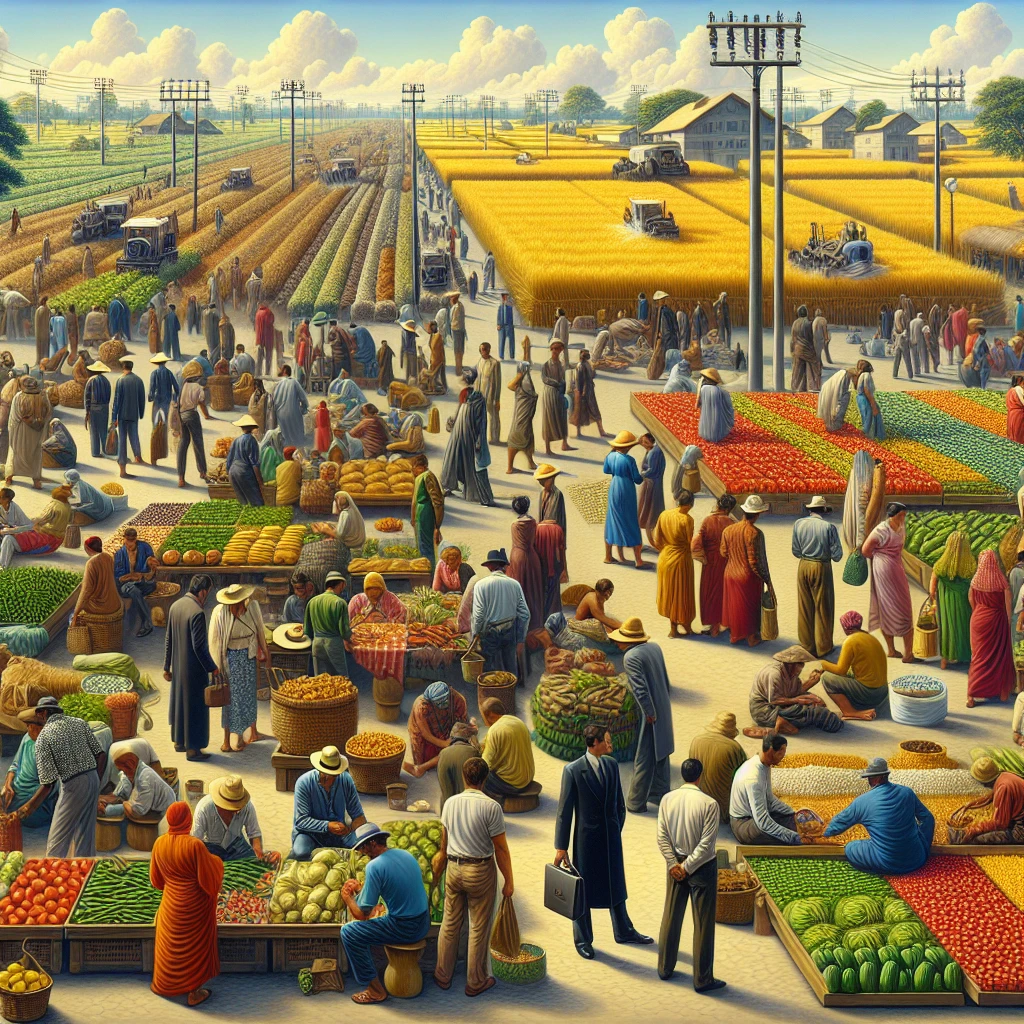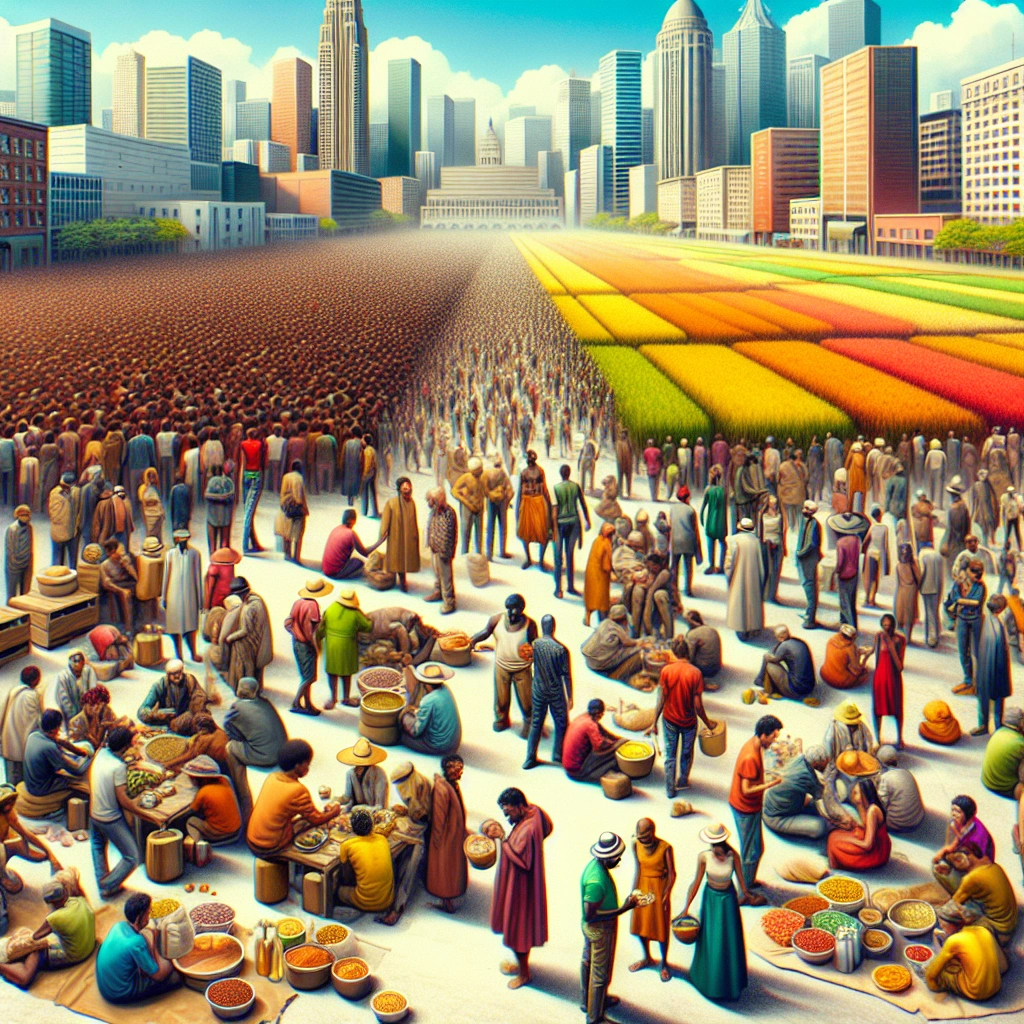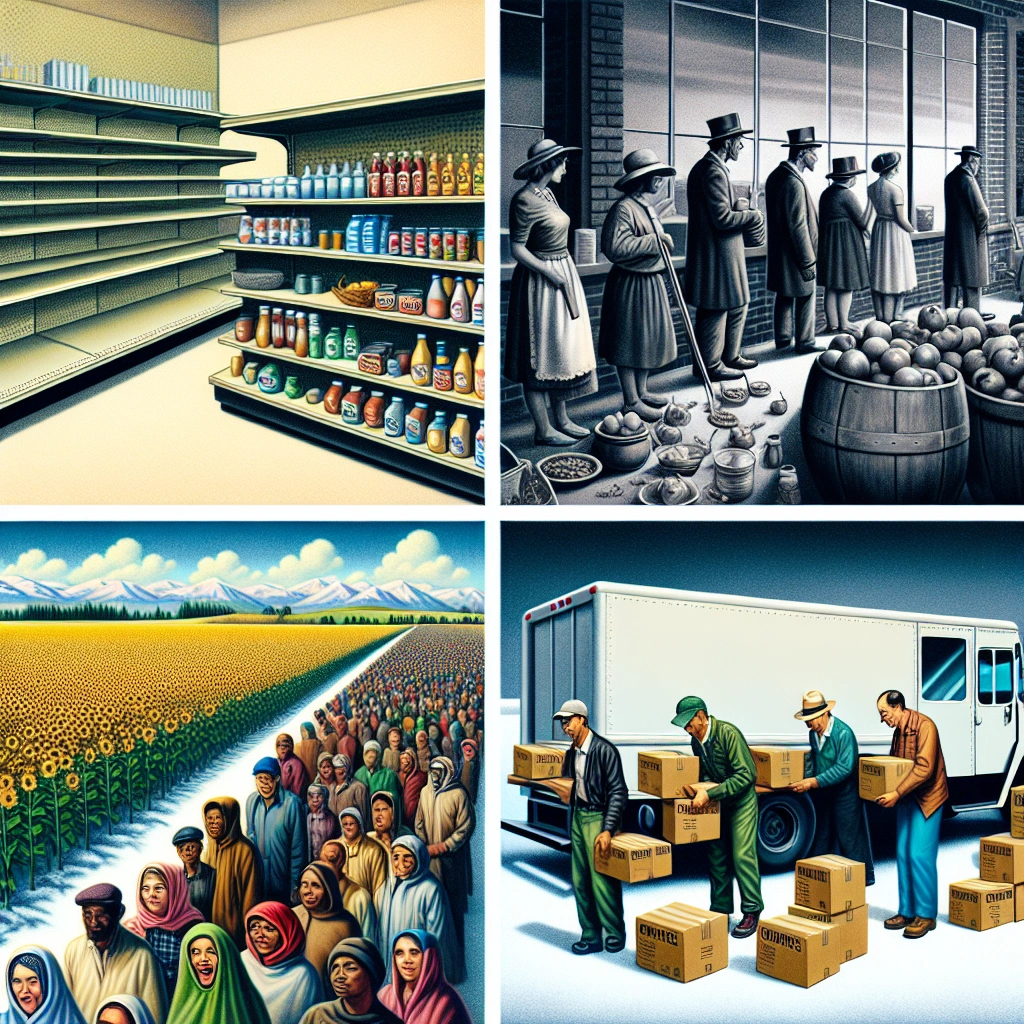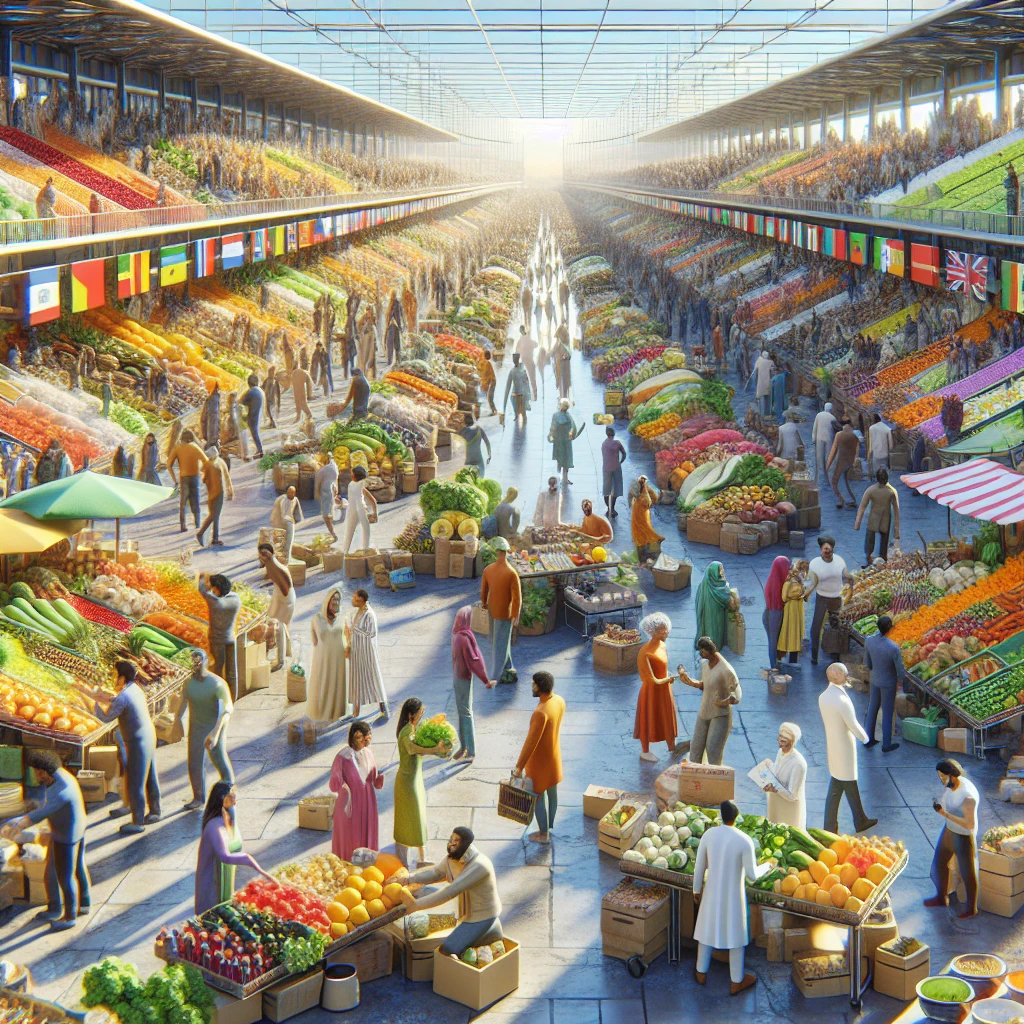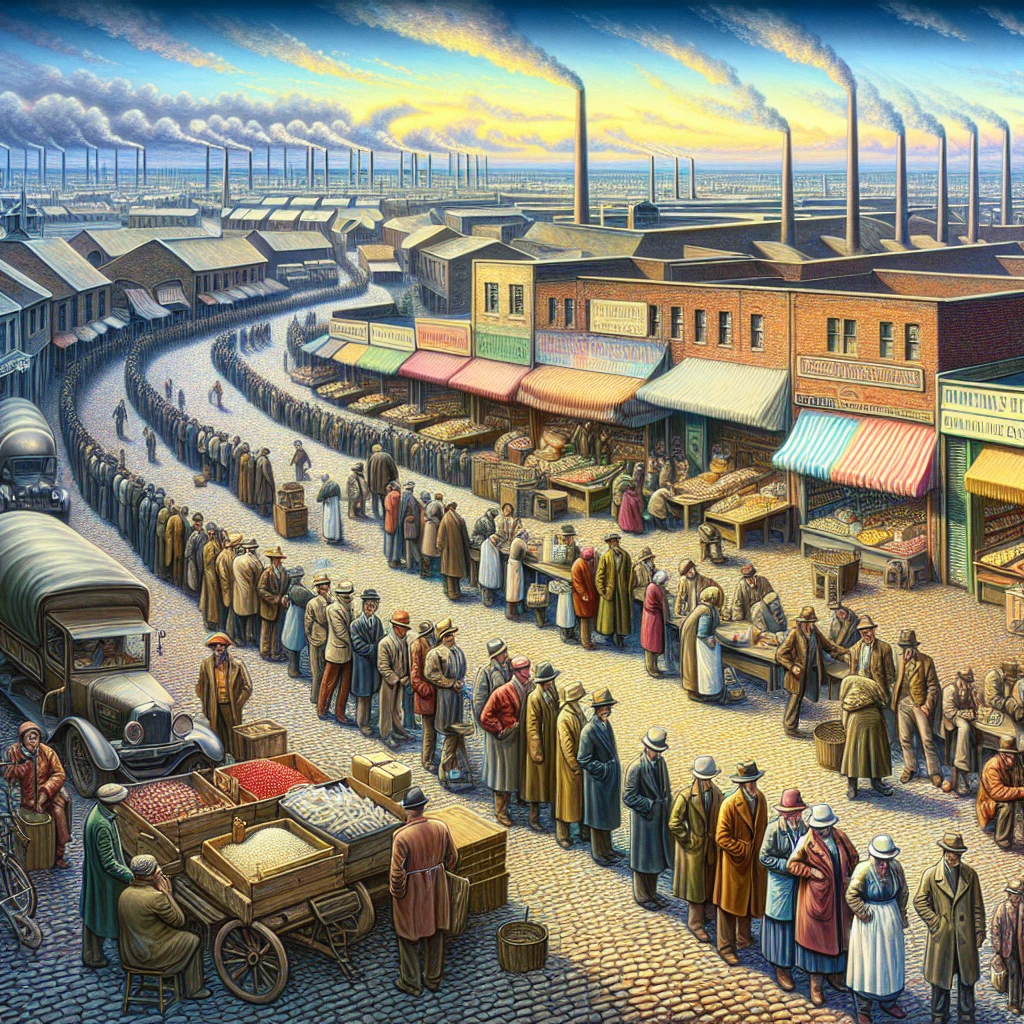

Food shortages can occur when there is not enough food produced or distributed to meet the needs of a population. This can have a significant impact on the economies of different countries, leading to higher food prices, reduced consumer purchasing power, and increased pressure on government resources to provide food aid and assistance.
Understanding the impact of food shortages on economies is crucial for developing effective policies and interventions to address the issue.
Check out this Youtube video: “Food Shortage or Economic Crisis? Experts Say … – YouTube” to understand how food shortages impact the economies of different countries in the world.
The Role of Agriculture in Economies
Agriculture, as a key economic driver, holds immense significance in shaping the economic landscape of a country. Not only does it contribute to the Gross Domestic Product (GDP), but it also plays a pivotal role in providing employment and fostering diverse industries such as farm production, forestry, fishing activities, textile mills, and food and beverage sales.
This multifaceted impact on the economy underscores the fundamental role of agriculture in driving economic growth and sustainability.
The significance of agriculture as a key economic driver
The significance of agriculture as a key economic driver is highlighted by its substantial contribution to the overall GDP of the United States, amounting to approximately 5.4 percent. Moreover, it provides employment opportunities to 10.4 percent of the U. S. population, further solidifying its role in bolstering the national economy.
Additionally, the output of America’s farms alone contributed a staggering $164.7 billion, accounting for around 0.7 percent of the country’s GDP.
Link between food shortages and agricultural productivity
Food shortages have a direct impact on agricultural productivity, as they can lead to disruptions in the food supply chain, affecting both local and regional scales. Climate change and extreme weather conditions can exacerbate food shortages, thereby hampering agricultural productivity and food availability.
In addressing food shortages, a critical approach involves enhancing agricultural productivity to meet the increasing demand for food. By leveraging strategies to mitigate the effects of food crises and bolstering agricultural growth, countries can effectively combat food shortages and ensure a sustainable food supply.
| Key Point | Insight |
|---|---|
| Agriculture’s GDP Contribution | 5.4% of U. S. GDP |
| Employment Impact | Provides jobs to 10.4% of U. S. population |
| Farm Output Contribution | $164.7 billion, approximately 0.7% of U. S. GDP |
Global Food Shortages and Economic Impact
The impact of food shortages on GDP
Food shortages can have a significant impact on a country’s Gross Domestic Product (GDP) by disrupting agricultural production and increasing the prices of essential food items. When a nation faces a scarcity of key food products, it often leads to inflation, which can negatively affect consumer spending and overall economic growth.
For example, in countries heavily reliant on agriculture, such as India and Nigeria, food shortages can directly impact their GDP by reducing agricultural output and increasing import costs.
Effects on employment and income levels
Food shortages can also have a profound effect on employment and income levels within a country. In regions heavily dependent on agriculture, such as rural communities in Sub-Saharan Africa and Southeast Asia, food shortages can lead to increased unemployment as farmers struggle to sustain their livelihoods.
Moreover, rising food prices due to shortages can strain household budgets, leading to reduced disposable income and lower purchasing power for essential goods and services.
| Country | Impact on Employment | Impact on Income Levels |
|---|---|---|
| India | Reduction in agricultural employment | Decreased purchasing power |
| Nigeria | Unemployment in rural communities | Reduced disposable income |
| Sub-Saharan | Higher unemployment among farmers | Strain on household budgets |
| Africa | ||
| Southeast | Decline in agricultural employment | Economic strain on rural areas |
| Asia |
Food Shortages and Inflation
Connection between food shortages and inflation rates
Food shortages can lead to an increase in food prices, contributing to inflation rates. When the supply of food is limited, the demand remains constant, causing the prices to surge.
This surge in food prices has a direct impact on the inflation rates, as it contributes to the overall increase in the cost of living for individuals and families. As a result, the connection between food shortages and inflation rates is evident, highlighting the influence of food scarcity on the broader economy.
Impact on consumer spending and disposable income
With rising food prices due to shortages, consumer spending is significantly affected. As individuals allocate a larger portion of their income to food purchases, they have less disposable income to spend on other goods and services, leading to reduced overall consumer spending.
This decline in consumer spending can have a domino effect on various industries and businesses, impacting economic growth. Additionally, the strain on disposable income affects the purchasing power of consumers, altering their buying patterns and ultimately influencing the stability of the economy.
| Country | Food Shortage Impact on Inflation | Consumer Spending Impact |
|---|---|---|
| United States | Food inflation contributes to overall inflation rates, affecting the cost of living. | Reduced disposable income leads to lower consumer spending on non-essential items. |
| India | Food shortages contribute to rising inflation, impacting the affordability of essential food items. | Decreased disposable income limits spending on luxury goods and services. |
Government Spending and Food Shortages
Allocations and Reallocations of Government Resources
During periods of food shortages, governments often reallocate resources to address the immediate needs of their citizens. This may involve reallocating funds from other sectors, such as defense or infrastructure, to support food aid programs and agricultural initiatives.
For example, the government may allocate additional funds to support food banks, subsidize food prices, or invest in agricultural technology to increase food production. Impact on Public Services and Infrastructure Development
Food shortages can significantly impact public services and infrastructure development.
Governments may struggle to allocate resources to maintain public services due to the increased demand for food-related assistance. As a result, infrastructure development projects may be delayed or scaled back to prioritize addressing the immediate food needs of the population.
Food Shortages and Trade
Effects on international trade and import/export activities
Food shortages have a significant impact on international trade and import/export activities. When a country faces a scarcity of essential food items, it often needs to increase its imports to meet the demand.
This can lead to a surge in import costs for food and fertilizer, adding pressure to the country’s balance of payments. Such pressures erode the country’s international reserves and diminish its ability to pay for essential food and fertilizer imports.
The higher import costs can also disrupt the balance of trade, affecting the country’s overall trade deficit. In extreme cases, it may compel countries to rely heavily on foreign supply, making them more susceptible to price volatility and market risks.
Implications for trade deficits and balance of payments
The implications of food shortages on trade deficits and balance of payments are substantial. The increased import costs for food and fertilizer directly contribute to a rise in the country’s balance of payments pressures, which in turn affects its international reserves.
This erosion of the reserves hampers the country’s capacity to finance essential imports, including food and fertilizer, further exacerbating the trade deficit. As a result, countries experiencing food shortages may encounter significant challenges in maintaining a favorable balance of payments and managing trade deficits effectively.
| Country | Impact on Trade Deficit | Impact on Balance of Payments |
|---|---|---|
| A | Increased due to higher import costs | Strain on international reserves affecting essential imports |
| B | Exacerbated due to reliance on foreign supply | Erosion of reserves hampering capacity to finance imports |
Food shortages have a direct and detrimental effect on international trade and import/export activities, leading to increased import costs, trade deficits, and pressure on balance of payments. These economic challenges can significantly impact the overall economic stability and growth of countries facing food scarcity.
Food Shortages and Poverty
Exacerbation of poverty levels
Food shortages exacerbate poverty levels by driving up the cost of food, making it unaffordable for low-income households. This forces families to allocate a larger portion of their income to food, leading to financial strain and increased vulnerability to poverty.
Impact on social welfare programs and poverty alleviation efforts
Food shortages have a significant impact on social welfare programs and poverty alleviation efforts. Government resources are stretched as they try to provide assistance to those affected by food shortages, leading to reduced funding for other essential services and infrastructure.
This strains the overall capacity to alleviate poverty, creating a cycle that is challenging to break.
| Poverty Exacerbation | Social Welfare Impact |
|---|---|
| Increased financial strain on households | Reduced funding for other essential services |
| Vulnerability to poverty | Strained capacity to alleviate poverty |
| Limited access to affordable, nutritious food | Strained government resources |
Food shortages directly contribute to the exacerbation of poverty levels and have a profound impact on social welfare programs and poverty alleviation efforts. The strain on government resources further complicates the fight against poverty, highlighting the urgent need for sustainable solutions to address food insecurity on a global scale.
Food Shortages and Food Security
Connection between food shortages and global food security
Food shortages have a direct impact on global food security by exacerbating hunger and malnutrition. When countries experience food shortages, it creates a ripple effect on the availability and affordability of food globally.
These shortages lead to increased competition for the limited resources, which can destabilize the overall food supply chain. As a result, global food security is compromised, posing a threat to the well-being of populations worldwide.
Implications for long-term food supply and demand
The implications of food shortages on long-term food supply and demand are substantial. Persistent food shortages can lead to a decrease in agricultural productivity, affecting the ability to meet the growing demand for food.
Additionally, long-term shortages can drive up food prices globally, making it more challenging for vulnerable populations to access essential nutrition. This, in turn, impacts the economic stability of different countries and can lead to social unrest and geopolitical tensions.
| Country | Economic Impact |
|---|---|
| Developing | Decreased GDP due to agricultural setbacks |
| Developed | Increased food import costs, affecting trade balance |
Food shortages have far-reaching consequences for global food security and the long-term supply and demand of food. Addressing these challenges requires coordinated efforts at both national and international levels to ensure sustainable and equitable access to food resources.
Environmental Impact of Food Shortages
Stress on natural resources and ecosystems
Food shortages place immense stress on natural resources and ecosystems. As communities and countries struggle to meet the demands for food, they often resort to unsustainable practices such as overfishing, deforestation, and excessive water usage.
This leads to the depletion of natural resources, loss of biodiversity, and disruption of ecosystems, ultimately exacerbating the environmental impact.
Implications for sustainable agriculture and environmental conservation efforts
The implications for sustainable agriculture and environmental conservation efforts are dire. Food shortages force farmers to engage in practices that degrade the soil, deplete groundwater reserves, and rely on harmful pesticides and fertilizers.
This intensifies the loss of arable land, contributes to water scarcity, and damages natural habitats. Consequently, the ability to uphold sustainable farming practices and environmental conservation becomes severely compromised, perpetuating a vicious cycle of environmental degradation in the face of food scarcity.
| Factors | Implications |
|---|---|
| Overfishing | Depletion of marine resources and disruption of aquatic ecosystems |
| Deforestation | Loss of biodiversity, soil erosion, and habitat destruction |
| Excessive water usage | Depletion of freshwater sources, ecosystem degradation, and threats to aquatic life |
Regional Variations in Economic Impact
Contrasting effects of food shortages in developed and developing economies
The impact of food shortages varies significantly between developed and developing economies. In developed countries, food shortages can lead to price fluctuations and limited access to certain food items, affecting consumer behavior and potentially leading to inflation in the food sector.
Conversely, in developing economies, food shortages can have more severe consequences, including malnutrition, decreased labor productivity, and heightened vulnerability to poverty, further exacerbating existing socioeconomic challenges.
Regional disparities in economic resilience and adaptation strategies
There are notable regional disparities in economic resilience and adaptation strategies in response to food shortages. Developed economies often have more robust infrastructure and resources to mitigate the effects of food shortages, such as government subsidies and social safety nets.
On the other hand, developing economies may struggle with limited resources and infrastructure, leading to heightened susceptibility to the adverse impacts of food shortages. Moreover, innovative adaptation strategies, such as sustainable agriculture practices and food security initiatives, are more prevalent in developed economies, contributing to their higher resilience levels compared to developing regions.
Technology and Innovation in Addressing Food Shortages
Role of technology in mitigating the impact of food shortages
The role of technology in addressing food shortages is paramount. GIS mapping, innovative weed detection systems, and efficient crop health monitoring are revolutionizing agricultural practices.
These technologies enable precise harvest planning, storage security, and real-time monitoring of pesticide and fertilizer application. Embracing upcycling, plant-based and cellular protein production, and digitization of the food supply chain are crucial steps in combatting food insecurity on a global scale.
Innovation in agricultural practices and food production methods
Innovative solutions in agricultural practices and food production are pivotal for sustainability. Technologies such as precision agriculture, smart irrigation, and biotechnology are enhancing efficiency, productivity, and sustainability in food production.
Additionally, advancements in automation, 3D food printing, nanotechnology, and lab-grown meat are driving the necessary revolution in sustainable food systems. These innovations are crucial for ending world hunger and ensuring food security for future generations.
| Technology | Impact |
|---|---|
| GIS Mapping | Enhanced planning and monitoring |
| Precision Agriculture | Improved efficiency and productivity |
| Upcycling | Sustainable resource utilization |
| Plant-based Protein | Environmentally friendly protein sources |
| 3D Food Printing | Advanced food production methods |
That’s how we are leveraging technology and innovation to address food shortages and safeguard the economies of different countries around the world.
Disaster Preparedness and Food Shortages
Natural disasters can have significant impacts on food shortages, leading to economic repercussions for various countries around the world. When natural disasters strike, such as hurricanes, floods, or tsunamis, they can directly affect the availability of food, disrupting agricultural production and leading to food crises.
These shortages can have a devastating effect on the domestic production of food, subsequently impacting the economic stability of the affected countries.
Link between natural disasters, food shortages, and economic repercussions
The link between natural disasters and food shortages is undeniable, as these disasters disrupt or destroy domestic food production, leading to scarcity and higher demand for imports. The economic repercussions are far-reaching, impacting the agriculture sectors of developing countries and costing them billions of dollars.
Moreover, the global food system’s fragility, exposed by disasters, emphasizes the need for more equitable, sustainable, and resilient systems.
Importance of disaster preparedness and emergency response strategies
Disaster preparedness and emergency response strategies play a crucial role in mitigating the impact of food shortages on economies. Stockpiling critical supplies such as food, water, and medical equipment before an emergency is imperative for ensuring that people have the necessary resources to stay safe.
Additionally, estimating the quantity of available food and calculating the dietary needs of affected populations are essential steps in preparing an emergency food supply.
| Food Shortage Impact | Economic Repercussions |
|---|---|
| Disrupts production | Higher demand for imports |
| Leads to scarcity | Exposes global food fragility |
Government Policies and Food Shortages
Role of government policies in addressing food shortages
Government policies play a crucial role in addressing food shortages by implementing measures such as financial assistance programs, agricultural subsidies, and food distribution networks to ensure food accessibility for all citizens. These policies also focus on promoting sustainable agricultural practices, investing in food research and development, and fostering international partnerships for global food security.
By prioritizing these measures, governments can effectively mitigate food shortages and build resilient food systems.
Examples of successful government interventions and support programs
Successful government interventions and support programs include the American Rescue Plan Act of 2021, which funded USDA’s nutrition assistance programs and extended a 15% increase in SNAP benefits to address food insecurity during the COVID-19 pandemic. Additionally, the U. S. Government’s Global Food Security Strategy aims to combat global hunger, poverty, and malnutrition through integrated whole-of-government approaches.
These initiatives demonstrate the positive impact of government policies in alleviating food shortages and promoting food security on a national and international scale.
| Government Initiatives | Impact |
|---|---|
| American Rescue Plan Act of 2021 | Extended SNAP benefits to combat food insecurity |
| Global Food Security Strategy | Aimed to end global hunger and malnutrition |
These examples highlight the effectiveness of government interventions in addressing food shortages and underline the significance of proactive policies in ensuring food stability and economic prosperity.
All statements and strategies are subject to change based on government regulations and policies.
International Aid and Assistance
Impact of international aid and assistance in addressing food shortages
International aid and assistance play a crucial role in addressing food shortages across the globe. It provides emergency food relief, cash transfers, and support for sustainable agricultural practices.
For example, organizations like the World Food Programme (WFP) and UNICEF have been instrumental in delivering food aid to vulnerable populations in crisis-affected regions, mitigating the immediate impact of food shortages.
Role of international organizations and partnerships in global economic recovery
International organizations and partnerships contribute to global economic recovery by supporting food security initiatives, promoting agricultural development, and fostering resilience against food crises. For instance, the International Monetary Fund (IMF) and the World Bank provide financial support to countries facing food shortages, enabling them to strengthen their agricultural infrastructure and improve access to food resources.
By fostering collaboration and coordination, these organizations enhance the capacity of nations to address food shortages and contribute to overall economic stability.
| Organization | Role in Economic Recovery |
|---|---|
| WFP | Delivering emergency food aid |
| UNICEF | Providing support to vulnerable populations |
| IMF | Offering financial assistance to address food shortages |
| World Bank | Supporting agricultural development and infrastructure |
These efforts demonstrate the essential role of international aid and partnerships in tackling food shortages and promoting economic recovery on a global scale.
Case Studies: Countries Affected by Food Shortages
Examples of countries facing severe economic impact due to food shortages
-
Democratic Republic of Congo (DRC): The DRC is the world’s largest hunger crisis, fueled by over 25 years of conflict and endemic poverty.
-
Afghanistan: In Afghanistan, food shortages have led to widespread economic challenges, further exacerbated by ongoing conflicts and political instability.
-
Syria: Food shortages in Syria have significantly impacted the country’s economy, worsened by the prolonged civil war and refugee crises.
-
Haiti: With a history of natural disasters and political instability, food shortages in Haiti have caused significant economic turmoil, affecting the livelihoods of many.
-
Zimbabwe: The economic impact of food shortages in Zimbabwe is profound, with the country grappling with political instability and economic hardships.
Comparison of economic challenges and responses to food shortages
| Country | Economic Challenges | Responses to Food Shortages |
|---|---|---|
| Democratic Republic of Congo | Endemic poverty and conflict exacerbate economic hardships | Aid programs and humanitarian efforts to provide food assistance |
| Afghanistan | Ongoing conflicts and political instability worsen economy | International aid and support for food security initiatives |
| Syria | Prolonged civil war and refugee crises impact economy | Humanitarian aid and international support for food relief |
| Haiti | Political instability and natural disasters affect economy | Emergency food assistance and long-term sustainable solutions |
| Zimbabwe | Political instability and economic challenges from shortages | Government and NGO efforts to address food insecurity issues |
The Future of Food Security and Economic Stability
Long-term implications for global food security and economic stability
Food shortages have profound long-term implications on global food security and economic stability. When countries face food shortages, it not only affects the availability of food for their citizens but also impacts the overall economy.
Decreased food production and availability lead to rising food prices, which can contribute to inflation and an increased cost of living. This can result in lower consumer purchasing power, impacting the overall economic stability of a nation.
Strategies for building resilience and ensuring economic recovery
To build resilience and ensure economic recovery in the face of food shortages, countries can implement several strategies. Diversifying agricultural practices and embracing sustainable farming methods can enhance food production and mitigate the impact of shortages.
Investing in technological advancements in agriculture, such as precision farming and hydroponics, can boost productivity and improve food security. Additionally, establishing efficient supply chain management and promoting international trade partnerships can help countries overcome food shortages and ensure stable economic growth.
| Strategies for Building Resilience | Explanation |
|---|---|
| Diversifying agricultural practices | Implementing a variety of farming methods to enhance food production and adapt to changing environmental conditions. |
| Embracing sustainable farming methods | Adopting environmentally friendly farming practices to ensure long-term food security and economic stability. |
| Investing in technological advancements | Utilizing innovative farming technologies to increase productivity and mitigate the impact of food shortages. |
| Establishing efficient supply chain management | Building robust distribution networks to ensure the efficient delivery of food supplies during times of scarcity. |
| Promoting international trade partnerships | Engaging in trade agreements to facilitate the exchange of food products and bolster food security on a global scale. |
Addressing the long-term implications of food shortages requires a multi-faceted approach that encompasses both agricultural strategies and economic policies. By implementing sustainable practices and fostering international cooperation, countries can build resilience and ensure economic recovery in the face of food security challenges.
Recommended Amazon Products for Food Shortages and Economic Impact
Here’s a curated list of products that can help address the impact of food shortages on economies. These recommendations are based on the need for sustainable agriculture and environmental conservation efforts, as well as technology and innovation in addressing food shortages.
Ring Alarm 8-Piece Kit
The Ring Alarm 8-Piece Kit is a comprehensive home security system that can contribute to disaster preparedness and emergency response strategies. Equipped with motion detectors, contact sensors, and a keypad, this kit provides an essential layer of protection for families and properties affected by natural disasters and food shortages. You can find the Ring Alarm 8-Piece Kit on Amazon here.


AeroGarden Harvest Indoor Hydroponic Garden
For households and communities facing food shortages, the AeroGarden Harvest Indoor Hydroponic Garden offers a sustainable solution for growing fresh produce year-round. This innovative gardening system requires minimal space and no soil, making it an ideal choice for urban areas with limited access to agricultural land. You can find the AeroGarden Harvest Indoor Hydroponic Garden on Amazon here.


Sawyer Products MINI Water Filtration System
Access to clean water is essential during food shortages and natural disasters. The Sawyer Products MINI Water Filtration System is a compact and portable solution for purifying water from freshwater sources, ensuring that individuals and communities have a reliable supply of safe drinking water. You can find the Sawyer Products MINI Water Filtration System on Amazon here.


YETI Tundra 45 Cooler
The YETI Tundra 45 Cooler is designed to preserve food and supplies in harsh conditions, making it an indispensable asset during food shortages and emergency situations. With its durable construction and superior insulation, this cooler can help maintain the freshness and safety of perishable items, providing peace of mind for individuals and families affected by supply disruptions. You can find the YETI Tundra 45 Cooler on Amazon here.


LifeStraw Personal Water Filter
The LifeStraw Personal Water Filter is a lightweight and portable tool that enables individuals to access clean drinking water directly from contaminated sources. Its compact design and ease of use make it a valuable resource for those impacted by food shortages and waterborne health risks, helping to improve overall resilience and well-being. You can find the LifeStraw Personal Water Filter on Amazon here.


Pros and Cons of Recommended Products
| Product | Pros | Cons |
|---|---|---|
| Ring Alarm 8-Piece Kit | Comprehensive home security solution | Requires initial setup and installation |
| AeroGarden Harvest Indoor Hydroponic Garden | Year-round fresh produce | Initial cost and electricity usage |
| Sawyer Products MINI Water Filtration System | Portable water purification | Limited filter lifespan |
| YETI Tundra 45 Cooler | Durable and insulating | Heavy when fully loaded |
| LifeStraw Personal Water Filter | Lightweight and portable | Limited capacity for group use |
Top Recommended Product for Food Shortages and Economic Impact
If you’re looking for the best solution for addressing the impact of food shortages on economies, we highly recommend the AeroGarden Harvest Indoor Hydroponic Garden for its sustainable approach to food production. Ready to improve food security and economic resilience? Check out the AeroGarden Harvest Indoor Hydroponic Garden here today for the best results!


Conclusion
Food shortages can have a significant impact on the economies of different countries in the world. When there is a lack of food, it can lead to inflation and increased food prices, putting a strain on consumers and causing a decrease in their purchasing power.
This can have a ripple effect on other sectors of the economy, leading to decreased productivity and potential economic downturn.
Additionally, food shortages can also lead to increased poverty and inequality within a country. This can result in social unrest, political instability, and an increased burden on the government to provide aid and support to those affected.
The overall impact on the economy can be long-lasting, affecting the country’s development and growth prospects.
Furthermore, food shortages can also lead to a decrease in exports for agricultural-based economies, impacting their trade balance and overall economic performance. This can also lead to an increase in reliance on food imports, further straining the country’s financial resources.
The impact of food shortages on the economies of different countries in the world can be far-reaching and require immediate attention and intervention.

